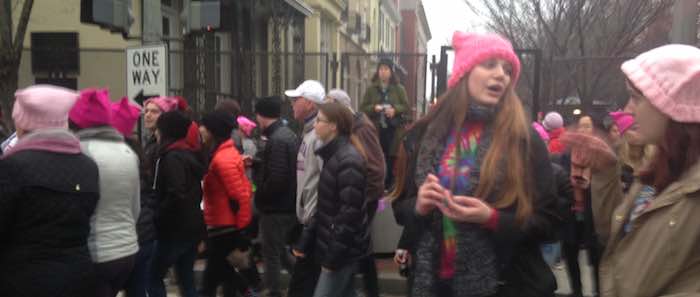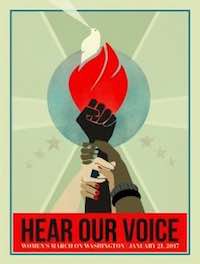By Tina Trent -- BombThrowers——Bio and Archives--January 24, 2017
American Politics, News | CFP Comments | Reader Friendly | Subscribe | Email Us

That's the first paragraph. The word "women" doesn't appear until the end of the second paragraph. But at least it shows up somewhere. If the black, brown, LGBTQIA, Muslims, etc. etc. had their way, the word "women" would have been eliminated entirely. In some cities, the march was rebranded specifically to exclude mention of women. You can be sure that, behind closed doors, woman-eliminationist arguments flew thick. Middle-class, melanin-deprived Yoplait-eaters may supply the bodies and the money for such events, but as is usual, leftist radicals took over the organizing.OUR MISSION
The rhetoric of the past election cycle has insulted, demonized, and threatened many of us--immigrants of all statuses, Muslims and those of diverse religious faiths, people who identify as LGBTQIA, Native people, Black and Brown people, people with disabilities, survivors of sexual assault--and our communities are hurting and scared. We are confronted with the question of how to move forward in the face of national and international concern and fear.
 So it was unsurprising that the logo they created was a Black Panther fist with hands of inferior colors propping it up, or something. Maybe the black fist was pulling up the other hands. Maybe they were pulling it down. It doesn't really matter how you see it, so long as someone can spout empty-headed nonsense about intersectionality nearby. For this reason, it is actually the perfect logo for the modern feminist movement:
Surprisingly, nobody has complained that the Jacobin caps worn by many marchers (they were called something else, and not bonnets rouges) were knitted with pink-colored yarn.
But hat iconography and mission statement angst were the least of the optics problems for organizers. There was also the problem of Hillary Clinton. And Bill Clinton. The day of the march, Hillary Clinton voiced her support, tweeting:
So it was unsurprising that the logo they created was a Black Panther fist with hands of inferior colors propping it up, or something. Maybe the black fist was pulling up the other hands. Maybe they were pulling it down. It doesn't really matter how you see it, so long as someone can spout empty-headed nonsense about intersectionality nearby. For this reason, it is actually the perfect logo for the modern feminist movement:
Surprisingly, nobody has complained that the Jacobin caps worn by many marchers (they were called something else, and not bonnets rouges) were knitted with pink-colored yarn.
But hat iconography and mission statement angst were the least of the optics problems for organizers. There was also the problem of Hillary Clinton. And Bill Clinton. The day of the march, Hillary Clinton voiced her support, tweeting:
Thanks for standing, speaking & marching for our values @womensmarch. Important as ever. I truly believe we're always Stronger Together.
— Hillary Clinton (@HillaryClinton) January 21, 2017
Support Canada Free Press

We must create a society in which women--including Black women, Native women, poor women, immigrant women, disabled women, Muslim women, lesbian queer and trans women--are free and able to care for and nurture their families, however they are formed, in safe and healthy environments free from structural impediments.Cynically, this sort of thing isn't directed at power brokers like Hillary Clinton or Gloria Steinem --or even at Donald Trump. It is designed to keep ordinary women in line, lest they question the professional activists spouting extremism under the banner of women's rights. This is the way the left works: power always exempts people from rules that apply to everyone else. The Huffington Post called the manifesto "a beautifully intersectional policy platform." "I didn't want to be part of the march if it was going to be a white-woman kumbaya march," sniffed Portland, Ore. NAACP president Jo Ann Hardesty. Steinem chimed in, scolding the little women who were not exempted from mandatory re-education, as she was. "Sexism is always made worse by racism--and vice versa," she wrote. "[White women] don't just get to join the march and not check their privilege constantly," explained spokesperson ShiShi Rose. "Now is the time for you to be listening more, talking less," Rose lectured on the organizing committee's Facebook page. "You should be reading our books and understanding the roots of racism and white supremacy. Listening to our speeches. You should be drowning yourselves in our poetry." No wonder professional feminists like Eve Ensler (see page 3 of the VDay 2016 annual report) spend their time churning out buckets of incomprehensible prose: incomprehensibility may be the last defense against the accusation of being insufficiently willing to drown in a puddle of black women's poetry. And no wonder so many people are looking at the women's march and sensing something uncomfortable and dishonest. Beneath all the Seventies-tinted agitprop, pink hats, and unity speeches, what the movement is really about is hatred of any woman who fails to submit to the right types of people while espousing the correct politics using the officially sanctioned words. It is laughable to call any of this pro-woman.
View Comments
Tina Trent writes about crime and policing, political radicals, social service programs, and academia. She has published several reports for America’s Survival and helped the late Larry Grathwohl release a new edition of his 1976 memoir, “Bringing Down America: An FBI Informer with the Weathermen,” an account of his time infiltrating the Weather Underground.
Dr. Trent received a doctorate from the Institute for Women’s Studies of Emory University, where she wrote about the devastating impact of social justice movements on criminal law under the tutelage of conservative, pro-life scholar Elizabeth Fox-Genovese.
Dr. Trent spent more than a decade working in Atlanta’s worst neighborhoods, providing social services to refugees, troubled families, and crime victims. There, she witnessed the destruction of families by the poverty industry, an experience she describes as: “the reason I’m now a practicing Catholic and social conservative.”
Tina lives with her husband on a farm in North Georgia. She blogs about crime and politics at tinatrent.com.